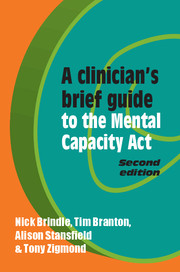Book contents
- Frontmatter
- Contents
- Preface
- Preface to the second edition
- Common abbreviations and terms
- 1 The legal framework: the Mental Capacity Act, the Human Rights Act and common law
- 2 The Mental Capacity Act and the authority to treat
- 3 Assessment of capacity
- 4 Best interests
- 5 Alternative authority – planning for the future
- 6 Independent Mental Capacity Advocates and regulation of research
- 7 Deprivation of Liberty Safeguards
- 8 The Court of Protection, clinically relevant judgments from the courts and writing reports
- 9 The Mental Health Act
- References
- Index
5 - Alternative authority – planning for the future
Published online by Cambridge University Press: 01 January 2018
- Frontmatter
- Contents
- Preface
- Preface to the second edition
- Common abbreviations and terms
- 1 The legal framework: the Mental Capacity Act, the Human Rights Act and common law
- 2 The Mental Capacity Act and the authority to treat
- 3 Assessment of capacity
- 4 Best interests
- 5 Alternative authority – planning for the future
- 6 Independent Mental Capacity Advocates and regulation of research
- 7 Deprivation of Liberty Safeguards
- 8 The Court of Protection, clinically relevant judgments from the courts and writing reports
- 9 The Mental Health Act
- References
- Index
Summary
The MCA, in addition to guiding clinicians’ practice when people lack the capacity to make decisions for themselves, authorises people who retain decision-making capacity to plan for a time when they lose capacity. There are two means by which they may do this:
‣ advance decisions to refuse treatment
‣ lasting powers of attorney.
These provisions allow capacitous individuals to make arrangements for a time when they may lack capacity. They are also known as anticipatory decisions. For the clinician, it is important to recognise when these powers exist and to understand how they apply. The substitute decision-making powers might be seen as mechanisms by which capable individuals can make or influence decisions that arise after they have lost the capacity to deal with them.
There is an additional substitute decision-making power in the MCA, which is provided by deputies appointed by the Court of Protection.
Advance decisions to refuse medical treatment
The terms ‘advance decision’, ‘advance statement’ and ‘advance refusal’ are often used synonymously. The important thing is to distinguish between advance requests for treatment and advance refusals of treatment. They all place a person who lacks capacity in the position they would have been in had they retained capacity (in relation to the specific treatment decision). A capacitous patient can request a specific medical intervention, but cannot demand it. Indeed, clinicians are duty bound to refuse to give any medical treatment that they do not believe to be in their patients’ best interests. On the other hand, a capacitous person can refuse medical treatment and that refusal must be honoured. Hence, the authority of the advance refusal. The MCA is quite clear that ‘the specified treatment is not to be carried out or continued’ if an advance refusal has been made.
To make an advance decision to refuse treatment, the person must be aged 18 or over and have the capacity to make the decision. It comes into force only if they lose capacity in relation to that decision.
- Type
- Chapter
- Information
- A Clinician's Brief Guide to the Mental Capacity Act , pp. 54 - 63Publisher: Royal College of PsychiatristsPrint publication year: 2015

